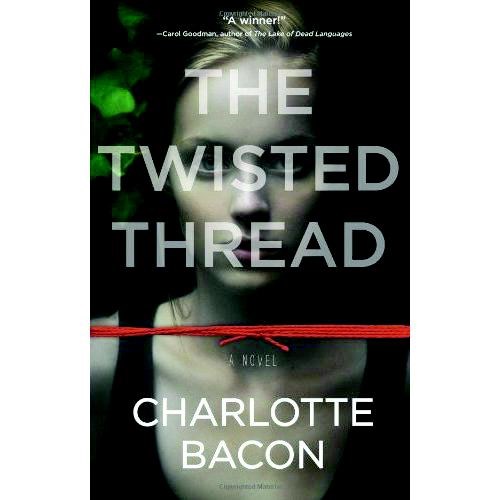The Twisted Thread
By Charlotte Bacon
Madeline Christopher isn't an accomplished young woman like Kate, her older sister.
Her love life is in long-distance tangles, her hair is in constant disarray, and her job search seems as ineffective as Madeline herself.
That's when polished older sister Kate steps in and gives Madeline a hand by recommending her for the position of intern at the prestigious Armitage
boarding school.
Teaching the children of some of America's oldest and richest families was a lot for Madeline to get used to, at first, but eventually she settled into a routine and even began to enjoy her underpaid position with its cramped quarters.
Until Claire, one of the most beautiful and popular students at Armitage, was found dead in her dorm. Dead - when Claire and all the other teen girls at the boarding school were under Madeline's supervision.
Instantly, Madeline finds herself in a role of increased responsibility, counselling grief-stricken Sally Jensen and learning about a ill-natured secret society from Claire's
jealous classmates.
It's more than she's ever had to handle before, but she feels she owes it to her students to discover how and why Claire died in her room - and why it appears that she gave birth shortly before death, but no baby can be found.
The Twisted Thread is a multi-faceted story about relationships and the secrets they hide.
Whether it's Madeline uncovering a secret society that binds all her female students together with a twisted thread, or a local police detective questioning the adults in charge of guiding the wealthy students, everyone is shocked by the dark, intricate currents that run beneath the seemingly-smooth surface at
Armitage Academy.
This is Charlotte Bacon's first mystery novel (she is the author of three other books) and it is a credible foray into the genre.
Drawing on her own experiences as a student at a New England boarding school,
Bacon has taken care to create characters that are imperfect enough to be believable. Look for this novel in the adult fiction area of the Prince George Public Library.
-- Reviewed by Rachel Huston, former marketing and development assistant at the Prince George Public Library.
Rubicon
By Tom Holland
One of the problems with how history is taught is a tendency to teach names and dates, an approach that extends to many books about history.
Tom Holland's books read like fast paced novels that attempt to place the reader into the spirit and uncertainty of the times. Historical events only look certain, or obvious, when we look backwards.
The future is always the undiscovered country, whether to us or our ancestors, two millennia ago.
Tom Holland's book, Rubicon, describes how the Roman Republic, with 400 years of freedom behind it, became the
Roman Empire.
In the Republic, aristocrats competed fiercely with their peers for power but power within constraint. No one was allowed to become too powerful as to become a dictator, except temporarily in times of
emergency.
Romans threw out their last king hundreds of years before and it was the threat of Julius Caesar becoming a king that led to his death on the marble floors of the Senate.
The book starts with the scene of Julius Caesar with soldiers of the 13th Legion, crossing the Rubicon.
Caesar was backed into a corner. If he surrendered his governorship of Gaul, he'd become an ordinary citizen and be prosecuted for war crimes. If his troops crossed into Italy, he would break the sternest laws of the Roman people.
He became too successful for his own good by conquering Gaul, creating a grave threat to the Republic itself. Either he would become dictator for life or he would die in the attempt.
However, Julius Caesar was only the latest of several would-be dictators during the last
decades of the Republic.
Until the time of Lucius Sulla, thirty years before, Roman generals lead the armies of Rome but always followed the
directives of Rome.
Sulla, at the head of an army in Italy, broke all the taboos by seizing the city and by making himself dictator. Sulla rewarded his friends well and utterly crushed his enemies.
The messages that he transmitted were rarely subtle. One time he ordered the senators to meet with him in the Temple of Bellona.
While coolly conducting his meeting, the senators heard shrieks from dying prisoners of war in the background. He ordered the senators not to be distracted. "Some prisoners are receiving their punishment. There is no need to worry; it is all being done on my orders".
Sulla, by breaking all the rules, created the new template for success for Roman aristocracy. Generals raised their own legions, whose men supported their benefactors in their quest for absolute power.
The loyalty of the soldiers was to their generals, not to the state. The result was a succession of civil wars until Augustus Caesar, adopted son of Julius Caesar,
became First Citizen of Rome.
Rubicon, by Tom Holland, tells the story of how Romans lost their freedoms. Although it reads like a novel, you'll find it in the non-fiction area of the Prince George Public Library.
-- Reviewed by John Shepherd,
former trustee for the
Prince George Public
Library board.



